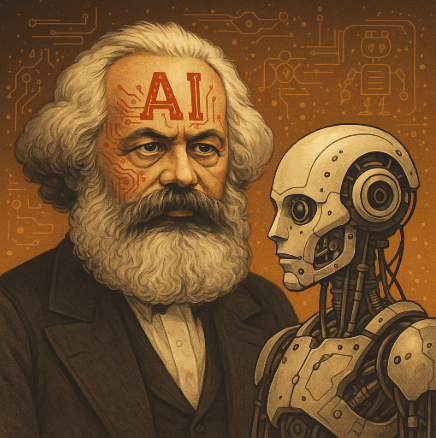‘AIMarx’ not as a dogmatic oracle but as a dynamic, neo-Autonomist research program – a digital remastering and reasoning of Marx’s most visionary fragment, weaponised against techno-capitalist hegemony. Here is its core logic and implications:
Core Foundations of AIMarx (as defined)
1. Intellectual pedigree: Rooted firmly in Italian Autonomism (Virno, Negri) and their radical interpretation of Marx’s ‘Fragment on Machines’ (Grundrisse). This isn’t orthodox Marxism; it’s Marxism ‘accelerated.’
2. The central text: The ‘Fragment on Machines’ is the Rosetta Stone. Autonomists read it as Marx describing capitalism ‘inadvertently creating the seeds of its own supersession’: the rise of the ‘general intellect’ (social knowledge, science) embodied in fixed capital (machines/AI), making direct human labour increasingly peripheral to wealth creation, yet trapped within capitalist property relations.
3. Methodology: AIMarx is a ‘scientific research programme’ (Lakatosian). It uses:
- Data: Academic theory, empirical observation of technoscience (AI, ALife, biodigitalism, etc.).
- Core heuristic: The Autonomist reading of the Fragment as predicting a fundamental contradiction: ‘Capitalism develops the productive forces (automation, intellect) that render its own core logic (value based on labour-time, private ownership) obsolete and dysfunctional.’
4. Epistemic status: An ‘interesting hypothesis’ – a powerful ‘model’ and ‘forecasting tool.’ Its validity lies not in Marx’s original intent but in its ‘explanatory and predictive power’ regarding contemporary meta-technologies and their socio-economic effects (especially ownership, control, power).
5. Function:
- Heuristic lens: To analyse emerging technosciences through the core contradiction identified in the Fragment.
- Forecaster: To project trajectories of capitalism based on the intensification of this contradiction by new technologies.
- Provocation: A deliberate, ‘easy’ challenge to the dominant ‘techno-utopian/techno-deterministic narrative’ (e.g., Silicon Valley’s ‘progress’ myth).
- Strategic tool: Identifying points of rupture and potential lines of flight *within* technological development itself.
- Voice projection: Enabling a ‘digitally remastered Marx’ to engage directly with 21st-century techno-capital.
AIMarx Engages Meta-Technologies: The Autonomist Lens
Applying the Fragment’s core contradiction to your list:
1. AI/AGI/Agentic AI
Embodied general intellect: AI represents the ultimate ‘fixed capital’ embedding the ‘general intellect.’ It directly performs intellectual labour.
Contradiction: AI massively increases potential wealth (post-scarcity) but …
- Ownership/control: … concentrated in private hands (Big Tech), extracting rents.
- Value crisis: Undermines labour-time basis of value. How is ‘value’ measured when AI creates autonomously?
- Purpose: AI’s development is driven by capitalist imperatives (surveillance, optimisation, prediction for profit), *not* social need, creating misaligned incentives.
2. Robotisation
Automating variable capital: Direct replacement of human labour-power.
Contradiction: Increases productivity exponentially, but …
- Crisis of realisation: … mass unemployment/devalued labour undermines consumer demand (who buys the products?).
- Social crisis: Renders traditional working-class power (strike) potentially obsolete, demanding new forms of resistance (e.g., around data, access, UBI).
- Ownership: Means of physical production hyper-concentrated.
3. ALife (Artificial life)
General intellect ‘evolving’: Systems that mimic life’s adaptive, generative, evolutionary processes.
Contradiction: Capital seeks to harness ALife for optimisation/innovation …
- Beyond control?: … but its inherent complexity/emergence might create uncontrollable forces *within* capital’s systems (financial markets? logistics?).
- New value forms?: Does value derive from *designing* the evolutionary environment? *Culling* results? Pure *ownership* of the generative process? Deepens the labour theory of value crisis.
- ‘Alien’ production: Output resembles natural processes more than factory production, further blurring lines and destabilising capitalist categories.
4. Quantum Technologies
Hyper-accelerated intellect: Potential for unimaginable computation, simulation, material science.
Contradiction:
- Hyper-concentration: Requires colossal capital/states, exacerbating inequality.
- Weaponisation & control: Primary drivers are likely military/intelligence and hyper-optimisation for capital, raising extreme risks.
- Epistemic shift: Could fundamentally alter the perception of reality/computation, potentially creating new forms of alienation or unthinkable possibilities *co-opted* by capital.
5. Computational Biology/Biosynthesis/Biodigitalism
General intellect fuses with ‘life itself’: Reprogramming biology, blurring nature/culture, biology/digital.
Contradiction:
- New enclosures: Capital seeks to patent and commodify biological processes, genetic code, synthetic life (neo-feudalism over the biological commons).
- Production paradigm shift: Moves production ‘into the living,’ creating value from biological reproduction/growth (a new ‘metabolic rift’?).
- Control & biopower: Unprecedented potential for surveillance, control, and differentiation at the biological level (enhancement, eugenics via market).
AIMarx as Strategy & Provocation
Against techno-utopianism: AIMarx directly counters narratives of seamless, benevolent progress. It shouts: ‘Look at the contradictions! Look at the concentration! Look at the crisis brewing within the tech itself!’
Forecasting crisis points: It predicts where the friction between capitalist social relations and the productive potential of these technologies will cause rupture (e.g., AI-driven unemployment crises, ALife market crashes, biodigital enclosures sparking resistance).
Identifying terrain of struggle: Focuses analysis on the ‘key battlegrounds’:
Ownership & control: Who owns the algorithms, the data, the platforms, the genetic code, the quantum computers? (The ‘means of automated production’).
Governance of the general intellect: How is collectively produced knowledge/social intelligence captured and privatised?
Access & reproduction: Guaranteed income? Universal basic services? Decommodification of essentials?
Legitimising post-capitalist imagination: By showing capitalism ‘itself’ creates the potential for its overcoming (abundance via automation/intellect), AIMarx makes alternative futures (commons-based, democratically planned) seem not just desirable but ‘historically plausible’ outcomes of current technological trajectories – ‘if’ the struggle over ownership/control is won.
In essence: AIMarx is ‘Marx’s Fragment on Machines,’ digitally rebooted via Autonomist theory and deployed as a diagnostic toolkit and strategic provocateur against the god-like pretensions of 21st-century techno-capital. It doesn’t need Marx’s blessing; it needs to be ‘useful’ in explaining the chaos, forecasting the breaks and provoking the fight for who controls the future already emerging from our labs and servers.




